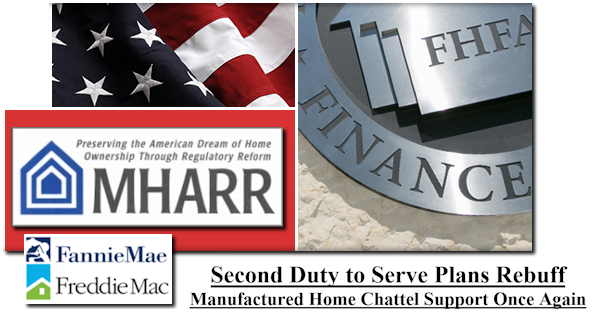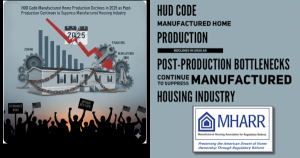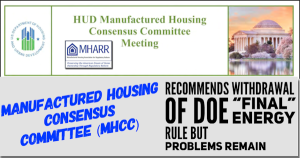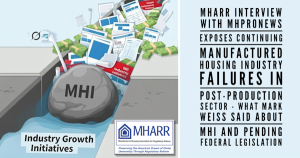Second Duty to Serve Plans Rebuff Manufactured Home Chattel Support Once Again

Washington, D.C., April 28, 2022 – The Manufactured Housing Association for Regulatory Reform (MHARR) reports that the Federal Housing Finance Agency (FHFA) has announced its “non-objection” to – i.e., approval of – Duty to Serve Underserved Markets (DTS) 2022-2024 implementation plans submitted by mortgage giants Fannie Mae and Freddie Mac. Without any meaningful explanation, the plans were accepted by FHFA even though the Fannie Mae plan contains no provision whatsoever for securitization or secondary market support for the personal property (chattel) loans that comprise nearly 80% of the mainstream, affordable manufactured housing consumer financing market. The Freddie Mac plan, meanwhile, offers the possibility of a meager 1500 to 2500 chattel loan purchases for “study” purposes in the plan’s final year – some 16 years following Congress’ enactment of DTS. As consumers and industry members know all too well, however, there is absolutely no guarantee that even this minimal level of purchase activity will actually occur, as similar “pilot”-type proposals contained in the Enterprises’ FHFA-approved 2017-2021 DTS plans were promptly jettisoned by Fannie Mae and Freddie Mac in subsequent amendments.
It is evident from the foregoing that FHFA’s January 5, 2022 rejection of Fannie and Freddie’s’ second DTS plans, as originally submitted (see, MHARR January 6, 2022 Memorandum, “FHFA Objects to 2022-2024 Duty to Serve Plans”), was either not based on the total failure of those plans to serve, in any manner, the vast bulk of the manufactured home consumer lending market represented by personal property loans, or was, instead, a meaningless gesture meant to blunt or mollify legitimate criticism of the Enterprises’ decade-plus failure to fully comply with the congressional DTS mandate and finally begin serving, in a market-significant manner, the single-largest segment of the single-largest source of affordable, non-subsidized housing and homeownership in the United States. In either case, however, Fannie Mae and Freddie Mac’s continuing failure – abetted by FHFA – to provide full and meaningful support for the existing, affordable manufactured housing market as mandated by DTS, stands in direct violation of applicable law and will inevitably undermine President Biden’s stated policy goals of eliminating the current severe shortage of affordable housing, advancing the availability of affordable manufactured housing, and ensuring housing equity, all as enunciated in recent “listening sessions” conducted by the White House Task Force on Manufactured Housing.
The ongoing de facto exclusion of manufactured home personal property loans from DTS by Fannie Mae and Freddie Mac, with the implicit support and approval of FHFA, is yet further evidence – and, in fact, confirmation that: (1) neither Enterprise has any interest in serving, in a meaningful or significant manner, the vast majority of the affordable, mainstream manufactured housing market; (2) that FHFA, far from exercising necessary leadership regarding DTS, is complicit in this failure; and (3) that the representation of the industry’s post-production sector has been ineffective, for far too long, in pressing for full and robust compliance with DTS and full, market-significant support for manufactured home personal property lending.
There is simply no excuse for this continuing failure by the Enterprises and FHFA – as their regulator – to comply with applicable law. FHFA and its current Director, Sandra Thompson, were educated in detail by MHARR members starting in 2020 as to the urgent need for mainstream DTS chattel support and the huge segment of the market for the industry’s most affordable homes that chattel lending serves. FHFA’s failure to require full compliance with the DTS mandate for the manufactured housing chattel sector as the mandate approaches its twentieth year, among other things, underscores the need for robust action and follow-up by the White House Manufactured Housing Task Force – and direct leadership by President Biden – to rectify this failure and ensure that manufactured housing takes a central role in resolving the nation’s affordable housing and housing equity crises. Further, it highlights the need for further – and effective – oversight by Congress to get to the bottom of Fannie Mae and Freddie Mac’s institutional refusal to provide full DTS support for the manufactured housing market and FHFA’s continuing complicity in that rejection of Congress’ express directive.
In Washington, D.C. MHARR President and CEO Mark Weiss stated: “FHFA’s non-objection to the Second DTS Plans submitted by Fannie Mae and Freddie Mac – plans which continue to exclude any meaningful support for the manufactured home personal property loans which represent the vast bulk of the mainstream, affordable manufactured housing market – is inexcusable. It represents an ongoing policy failure on the part of the Enterprises and FHFA which specifically impacts and harms lower and moderate-income Americans seeking access to affordable housing and full participation in the American Dream of homeownership. It also illustrates the ongoing failure of the industry’s post-production representation to effectuate the full implementation of this crucial statutory directive.” Weiss continued, “This parade of failures demands a comprehensive congressional oversight hearing regarding the implementation of DTS within the manufactured housing market – and particularly its chattel sector – to provide answers and relief for the millions of American families who have waited far too long for DTS to be fully implemented.”
The Manufactured Housing Association for Regulatory Reform is a Washington, D.C.-based national trade association representing the views and interests of independent producers of federally-regulated manufactured housing.

Washington, D.C., April 28, 2022 – The Manufactured Housing Association for Regulatory Reform (MHARR) reports that the Federal Housing Finance Agency (FHFA) has announced its “non-objection” to – i.e., approval of – Duty to Serve Underserved Markets (DTS) 2022-2024 implementation plans submitted by mortgage giants Fannie Mae and Freddie Mac. Without any meaningful explanation, the plans were accepted by FHFA even though the Fannie Mae plan contains no provision whatsoever for securitization or secondary market support for the personal property (chattel) loans that comprise nearly 80% of the mainstream, affordable manufactured housing consumer financing market. The Freddie Mac plan, meanwhile, offers the possibility of a meager 1500 to 2500 chattel loan purchases for “study” purposes in the plan’s final year – some 16 years following Congress’ enactment of DTS. As consumers and industry members know all too well, however, there is absolutely no guarantee that even this minimal level of purchase activity will actually occur, as similar “pilot”-type proposals contained in the Enterprises’ FHFA-approved 2017-2021 DTS plans were promptly jettisoned by Fannie Mae and Freddie Mac in subsequent amendments.
It is evident from the foregoing that FHFA’s January 5, 2022 rejection of Fannie and Freddie’s’ second DTS plans, as originally submitted (see, MHARR January 6, 2022 Memorandum, “FHFA Objects to 2022-2024 Duty to Serve Plans”), was either not based on the total failure of those plans to serve, in any manner, the vast bulk of the manufactured home consumer lending market represented by personal property loans, or was, instead, a meaningless gesture meant to blunt or mollify legitimate criticism of the Enterprises’ decade-plus failure to fully comply with the congressional DTS mandate and finally begin serving, in a market-significant manner, the single-largest segment of the single-largest source of affordable, non-subsidized housing and homeownership in the United States. In either case, however, Fannie Mae and Freddie Mac’s continuing failure – abetted by FHFA – to provide full and meaningful support for the existing, affordable manufactured housing market as mandated by DTS, stands in direct violation of applicable law and will inevitably undermine President Biden’s stated policy goals of eliminating the current severe shortage of affordable housing, advancing the availability of affordable manufactured housing, and ensuring housing equity, all as enunciated in recent “listening sessions” conducted by the White House Task Force on Manufactured Housing.
The ongoing de facto exclusion of manufactured home personal property loans from DTS by Fannie Mae and Freddie Mac, with the implicit support and approval of FHFA, is yet further evidence – and, in fact, confirmation that: (1) neither Enterprise has any interest in serving, in a meaningful or significant manner, the vast majority of the affordable, mainstream manufactured housing market; (2) that FHFA, far from exercising necessary leadership regarding DTS, is complicit in this failure; and (3) that the representation of the industry’s post-production sector has been ineffective, for far too long, in pressing for full and robust compliance with DTS and full, market-significant support for manufactured home personal property lending.
There is simply no excuse for this continuing failure by the Enterprises and FHFA – as their regulator – to comply with applicable law. FHFA and its current Director, Sandra Thompson, were educated in detail by MHARR members starting in 2020 as to the urgent need for mainstream DTS chattel support and the huge segment of the market for the industry’s most affordable homes that chattel lending serves. FHFA’s failure to require full compliance with the DTS mandate for the manufactured housing chattel sector as the mandate approaches its twentieth year, among other things, underscores the need for robust action and follow-up by the White House Manufactured Housing Task Force – and direct leadership by President Biden – to rectify this failure and ensure that manufactured housing takes a central role in resolving the nation’s affordable housing and housing equity crises. Further, it highlights the need for further – and effective – oversight by Congress to get to the bottom of Fannie Mae and Freddie Mac’s institutional refusal to provide full DTS support for the manufactured housing market and FHFA’s continuing complicity in that rejection of Congress’ express directive.
In Washington, D.C. MHARR President and CEO Mark Weiss stated: “FHFA’s non-objection to the Second DTS Plans submitted by Fannie Mae and Freddie Mac – plans which continue to exclude any meaningful support for the manufactured home personal property loans which represent the vast bulk of the mainstream, affordable manufactured housing market – is inexcusable. It represents an ongoing policy failure on the part of the Enterprises and FHFA which specifically impacts and harms lower and moderate-income Americans seeking access to affordable housing and full participation in the American Dream of homeownership. It also illustrates the ongoing failure of the industry’s post-production representation to effectuate the full implementation of this crucial statutory directive.” Weiss continued, “This parade of failures demands a comprehensive congressional oversight hearing regarding the implementation of DTS within the manufactured housing market – and particularly its chattel sector – to provide answers and relief for the millions of American families who have waited far too long for DTS to be fully implemented.”
The Manufactured Housing Association for Regulatory Reform is a Washington, D.C.-based national trade association representing the views and interests of independent producers of federally-regulated manufactured housing.













